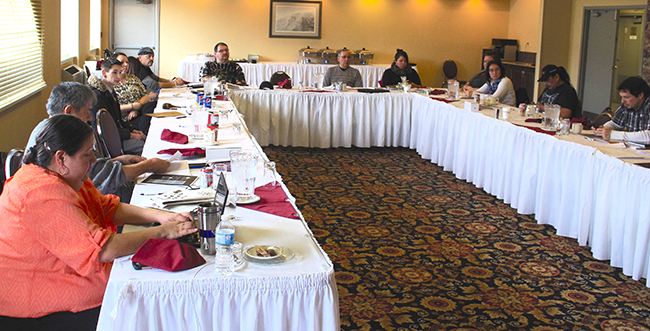Talking about resource benefit sharing in the north

By Rick Garrick
THUNDER BAY — Northern Superior Region representatives are looking to continue working on resource benefit sharing after a successful meeting with Union of Ontario Indian staff in Thunder Bay.
“We’re starting to see a group of our community members come to the table — they’re educated, they’re well informed and they want to make a difference,” says Lands and Resources director Jason Laronde at the conclusion of the March 12 Anishinabek Nation: Resource Benefit/Revenue Sharing Session. “If that’s the spark that gets things rolling and supports leadership decision making authorities, then great. We know in our communities that we have all kinds of councils and committees that help make decisions in the community that are effective and they work. So why can’t we do that in a broad (sense) over the whole region.”
Laronde met with about 15 Northern Superior Region leaders and technicians at the Nor’wester Hotel and Conference Centre to provide an update on resource revenue sharing discussions and to seek input from the communities.
“There is a willingness with our younger technicians that are at the table wanting to move beyond the issues of politics and get right down to the brass tacks of doing our business, to get into the detail and provide that support back to the leadership,” Laronde says.
Red Rock’s Alyssa Ray says the communities need to work together on the resource revenue sharing issue.
“It’s a good starting board for the direction we all want to go in,” says the Lands and Resources consultation points person administrative assistant. “Lots of the messages from the communities have been consistent in that we need to work together.”
Pic Mobert Councillor John Kwissiwa says unified election codes would encourage leaders from the Northern Superior Region communities to work together on various issues, including resource revenue sharing.
“We’ve got to have elections at the same time and we’ve got to have a longer term,” Kwissiwa says. “So we could all be on the same page and work together.”
Kwissiwa says people from the different communities worked together and shared with each other in the past.
“Once we lose our language, we lose our self-respect and we lose our land and we start fighting,” Kwissiwa says. “That is why I think it is important to be consistent — how you are going to do that is have elections on the same day just like the mayors.”
Rocky Bay and Northern Superior Region Elder Mike Esquega says many community members have relatives in different communities, so they have common ground to work together.
“My own family originates from Wikwemikong down to Red Lake, Minnesota, and even history shows we are from the Trail of Tears (in the United States),” Esquega says. “We need to take a stand — we need to develop an agreement that is going to get us some of those resources, not just money, not just the financial end of it but actually being part of some of those extraction (processes) and benefit from those in jobs and in training.”
Long Lake #58’s Frank O’Nabigon says individual First Nation communities are already in discussions with industry and government officials.
“There may be some conflicts as to who is going to be and what agreements are going to be recognized,” O’Nabigon says. “So I think there is a lot of work that has to be done to educate and to make sure that First Nations understand.”


